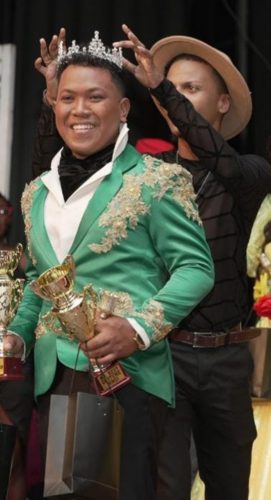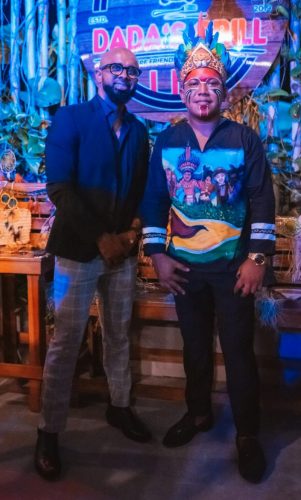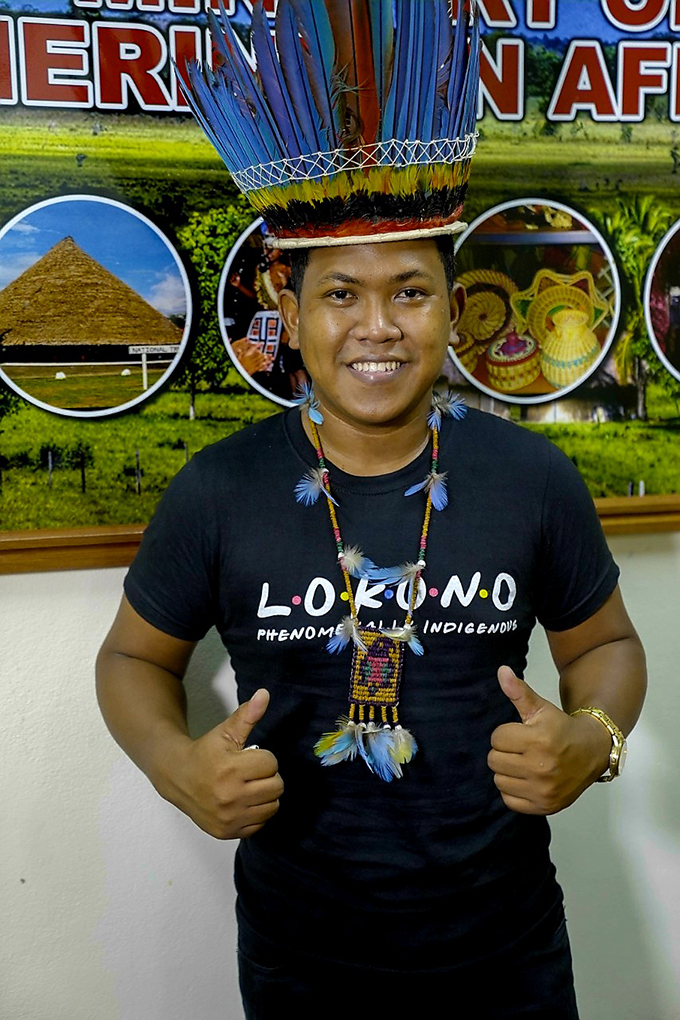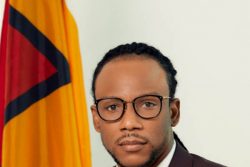To call Calvin Roberts, 27, ambitious might be an understatement.
Roberts has his sights set on many achievements, not least of which is becoming a medical doctor. Roberts, of Lokono (Arawakan) ancestry, also wants to be a restauranteur specialising in indigenous cuisine.
For now, however, he is only a medical laboratory technician, a youth ambassador, volunteer, student and Mr Guyana Independence 2022, a title he won in late May and which he hopes to use as a platform to inspire other young indigenous men to make the foray into pageantry. In this regard, he is hoping that authorities would introduce a Mr Indigenous Heritage pageant.

“I am suggesting that the Ministry of Amerindian Affairs, which stages the Ms Indigenous Heritage pageant, also stages a Mr Indigenous Heritage pageant to complement the women’s pageant. Most times you find Indigenous women are taking the lead and the men are just laid back. I would like to create that platform for them so they can come forward and take part.”
In an interview, Roberts told Stabroek Weekend, “I am willing to work with any male participant who would want to represent the Indigenous people in male pageantry.”
As a youth ambassador, Roberts represented Guyana at the 2018 United Nations 22nd Youth Assembly in New York, USA, where he was one of three Guyanese youth ambassadors and the only Indigenous youth. “I found myself not only representing Guyana but representing Indigenous Peoples on the international front as well and I had to showcase my culture, my heritage and my identity on stage.”
When he learnt about the Independence pageant, he thought about his participation in the youth assembly and decided he wanted to take part in the event to represent Indigenous Peoples and he won the male segment of the pageant. “Having graced the stage representing who I was as a young Guyanese and Indigenous man in New York, I had confidence going out on the stage to enjoy myself and to win.”
Everything he did in the pageant was indigenously oriented. “My costume was designed and created by Dillon Craig, Devon Allicock and Courtney Douglas, all Indigenous artists. Roxy Fashions sewed the body suit, Craig painted the jaguar’s face, a symbol of the king of the jungle and a king on stage that night on the front of the costume. Together, artists painted the back of the cape which featured an eco-system. Craig made the headdress. The concept was mine.”
Noting that there is not much representation in national pageants when it comes to Indigenous Peoples, he said, “I don’t see many young people coming forward. I want to be that person to motivate young Indigenous males. With the exception of Paul Charles, who I look up to as a role model and try to emulate, I don’t know of any other Indigenous young man who would have done pageantry before. Charles is multitalented and apart from also being a dancer he was once Mr Guyana Tourism and Mr Model Tourism of the World 2021.
“He paved the way for people like me and I want to continue in that space so that fellow young men can say ‘Calvin did this and I can do it myself’.”
Roberts and Ms Independence Guyana, Kayla King, who is also from Region Three, are currently working on a community project to help persons benefit from the creative arts. This project is part of their platform for taking part in the Independence pageant.
Cloudland
Roberts’ grandparents are from Cloudland, Manawarin, in Moruca, Region One- Barima/Waini but he has never been there and it is his wish to visit the area sooner than later. He was born in Venezuela and came to Guyana at two years old with his parents when they remigrated. He grew up in Zeelugt, Region Three – West Demerara/Essequibo Islands.
“As the eldest child, I had a lot of responsibilities, including taking care of my two younger siblings while my parents worked hard to give us a good education.”
He attended Zeelugt Primary and then Leonora Secondary School, where he completed his secondary education. Just out of school he took part in the laboratory technician’s course with the Ministry of Health in 2012. “I graduated as the valedictorian of that batch and I was appointed to work as a medical laboratory technician at the National Reference Laboratory, Public Health. Two years later I took a transfer to the West Demerara Regional Hospital where I currently work.”
Youth ambassador
As a youth ambassador with the Ministry of Culture, Youth and Sport, Roberts is very engaged in volunteerism. As a youth leader in Region Three, he is also involved with the youth group Small Steps, Big Impact, which is under the supervision of the ministry.
He does volunteer work in his spare time but especially on weekends. He volunteers with both governmental and non-governmental organisations, such as the Guyana Cancer Founda-tion, Divine Medical Centre, the Guy-ana Cancer Society and the Ministry of Culture, Youth and Sport.
“I volunteer because I like to call myself a humanitarian and I know that I can assist. My job as a lab technician has created that platform for me to give voluntary service and it is something I have come to love. These organisations have also created the avenue for me to assist in my free time volunteering in the medical field. The same duties I would do at the hospital, taking blood samples, sugar testing, pressure testing, a bit of triaging and so forth, I do when I volunteer.”
He is currently pursuing a degree in medicine. “It is my passion to be a medical doctor.”
Growing up as an indigenous person in Zeelugt, Roberts said, “I have always been confident and proud of who I am, thanks to my parents, who instilled in me that pride in my heritage. I do know that at times some Indigenous People might feel inferior to their counterparts because of how society labels us. I always worked hard and I strove to be a role model, even at a young age. I had a lot of youngsters who used to look up to me. So I believed that I had to be, even at an early age, that young individual that young people can emulate.”
In later years when he was exposed to some forms of cultural prejudices because of his ethnicity, Roberts said, “I had the courage, to time and time again, be the better person and an example, especially for young Indigenous people who may have low self-esteem and who may not be as confident as I am and proud of my identity.”

Calvin’s Indigenous Cuisine
“After my cultural performance on my heritage at the UN Youth Assembly, where I also copped the prize for the best traditional costume, and which I felt was greatly appreciated by thousands of young people from various countries, it dawned on me on stage that if I can represent my country and my Indigenous Peoples’ heritage on the international stage and get a warm reception, I believed I could represent Indigenous People in my country at the local level.”
On his return home, he thought about what he could do to promote and encourage people to sustain the Indigenous way of life in Guyana. The thought about opening a business came but the business only happened in 2021 because he had no finance to open and sustain it. “The idea of selling indigenous cuisine was there and a few friends and I brainstormed about how to go about it.”
In 2021 he started from his home in Zeelugt by serving five meals consisting of meat cooked in a sauce made from the juice extracted from the cassava root called ‘tuma’ also known as ‘kadakura’ or ‘kada’ with cassava bread. As word got around, it was well received by those persons inside and outside of Zeelugt and Region Three. Eventually it expanded. “There is a great demand for indigenous food not only in Region Three but other areas of the coastland.”
The main aim of his business, which he promotes in the Lokono language (‘Han-the-wako-tha-the’ means ‘Come let’s eat’), he said, is to sustain and promote the slowly dying culture, including the foods of Indigenous Peoples.
“On the coastland, I know Indigenous Peoples and other non-Indigenous Peoples have to wait until September when it is Amerindian Heritage Month to get an indigenous dish. When I launched the business it was to encourage people to come any day to get such a meal.”
How does he balance his professional work life with business? Roberts said his mother and a cousin operate the business at home. “It continues to operate on a preorder basis because it was launched during the height of the Covid-19 pandemic. People preorder their meals, we prepared them and the customers collect.”
A customer can purchase labba, deer, wild hog, bush cow or fish in tuma or kada. While other fish is prepared, tambaqui is the most in demand. He recently introduced chicken tuma for those who do not eat wild meat or fish. Fish or meat is served with cassava bread or farine.
“I do not offer rice or other staples because I try to keep the food as indigenous as possible. The tuma/kada is really spicy. Pepper is a main ingredient. Some like it very spicy and some not so spicy so we serve based on demand. Cassareep pepperpot, is only sold on Sundays.”
The potato beverage, fly, is also available.
With people now familiar with his mother and cousin, they also receive orders. Roberts works in the business during his spare time in the afternoons and on the weekends
He sources meat from the East Coast Demerara and from another supplier in Region Three. “My relatives in Cloudland make the cassava bread, cassava water and cassareep. We buy from them.”
At present Roberts has an arrangement with Ken Rampersaud, owner of Dada’s Grill in Tuschen, a short distance from where he lives, to provide a weekly service once a month so people can dine in-house on indigenous meals.
This service was launched on June 11 under the theme, ‘A Heritage, We Can’.
Last year, Roberts catered for the opening of the Amerindian Heritage Village and the week-long activity, the Ministry of Amerindian Affairs, the Ministry of Health and some private entities.
At present, he said, he is booked for the entire Amerindian Heritage Month of September.
“Down the line I am looking forward to owning my own restaurant. At present the issue is accommodation and finance. Some good people have been coming my way and I am working with them.”
In a message to youths, especially Indigenous youths, he said, “Be the best version of yourself. Maximize your potential. Many times we are seen as inferior or as society labels us. Negative opinion of others about our culture should not have an impact on us. Let us be proud of who we are, our culture, our heritage and leave our footprints in the sand.”









